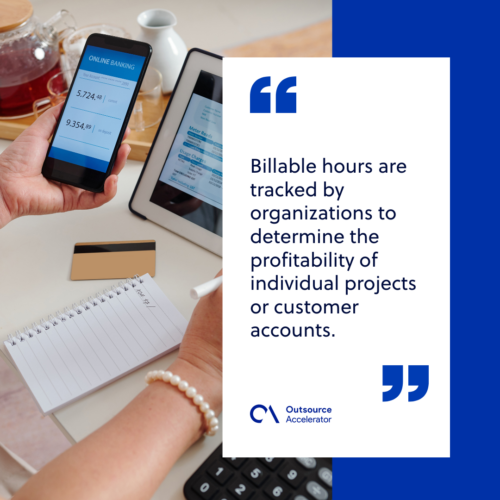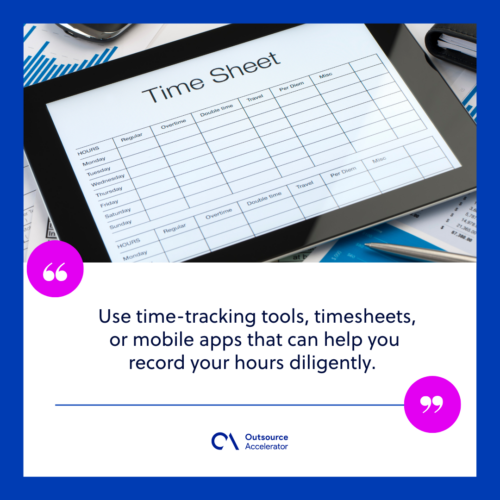Tracking your billable hours for financial success
For many professional services, time is money, and the currency of success often comes in the form of “billable hours.”
These hours represent more than just numbers on an invoice. They are the lifeblood of countless industries, from law firms and consulting agencies to freelancers and creative studios.
The accurate measurement and effective management of billable hours can significantly impact a company’s revenue potential. Understanding the importance of tracking is crucial for those aiming to increase their efficiency.
Companies can unlock their true potential and drive sustainable growth by adopting strategies to maximize billable hours.
What are billable hours?
Billable hours refer to the hours worked by an employee directly contributing to generating revenue or billable income. These hours typically include time spent on:
- Client projects
- Consultations
- Meetings
- Other work related to service delivery
Billable hours are tracked by organizations to determine the profitability of individual projects or customer accounts. Tracking them ensures accurate billing and profitability analysis.
Billable hours are usually associated with professions like lawyers, consultants, freelancers, and other professionals who offer their expertise on a time-based billing model.

How to calculate billable hours
Here’s a step-by-step guide on how to calculate billable hours:
Define billable activities
Identify the activities that are considered billable in your organization’s context. These are typically tasks directly related to client work or projects.
Track time
Have employees track the time they spend on each billable activity accurately. You can do this using the following methods:
- Manual entry in a timesheet
- Time-tracking software or apps that automatically record your hours
- Time clocks or timers if you work in a physical office or location
Some companies also require dividing recorded hours based on the nature of the work. For example, you can divide billable hours based on:
- Client meetings
- Research and analysis
- Writing or designing
- Phone calls and correspondence
Calculate the total
Once the complete time tracking data is available, calculate the total hours spent on each billable activity. Summing up all the billable hours for each activity will get you the total for a specific time period.
Summarize the billable amount
Multiply your total billable hours by your billing rate. This will help you calculate the amount that should be invoiced by your company (or the client).
Analyze and report
Create an invoice that clearly outlines the billable hours, tasks performed, and the total amount due. Include any additional charges, such as expenses, if applicable.
Review the data and analyze it. This can help in understanding resource allocation, project profitability, efficiency of different tasks, or individual employee contributions.
Increasing your billable hours
Increasing billable hours can be beneficial for those in fields that rely on this billing model. Here are several strategies to help you increase your billable hours:
Efficient time management
Focus on improving time management skills to minimize non-billable activities and maximize billable work. Prioritize tasks, establish clear goals and deadlines, and eliminate distractions.
Accurate time tracking
Accurately track and report your time spent on billable activities. Use time-tracking tools, timesheets, or mobile apps that can help you record your hours diligently.
Avoid underestimating or rounding down your time spent on a task, as it can lead to potential revenue loss.

Streamline administrative tasks
Find ways to streamline administrative tasks that do not directly contribute to billable hours. You can dedicate specific periods in your day to prevent them from eating into your billable hours.
Automate repetitive processes and use technology tools for documentation and reporting to reduce the time spent on administrative work.
Continuous skill improvement
Continuously improve your productivity skills and enhance your expertise in areas directly related to billable work. Improved efficiency leads to faster task completion.
Stay updated with industry trends and technology advancements, and develop new skills that can allow you to take on more billable projects.
Minimize non-billable activities
Identify non-billable tasks that can be delegated, outsourced, or eliminated. Doing this wherever possible frees up time for more billable activities.
Improve client communication
Maintain clear and regular communication to inform clients of your progress, including any potential issues. This helps build trust, ensure client satisfaction, and may lead to additional billable opportunities.
Collaborate with colleagues
Collaborate with colleagues and seek feedback to improve your effectiveness. Sharing knowledge can help identify better ways to handle projects.
Joint ventures can also open up new opportunities.
Remember, while increasing billable hours is essential, it’s also important to maintain a healthy work-life balance. Strive for efficiency, but not at the expense of burnout or compromising the quality of your work.
Why tracking your billable hours matters
Here’s why tracking your billable hours is important:
Accurate billing
Tracking billable hours allows businesses to bill clients for the services provided accurately. This ensures fair and transparent invoicing.
Profitability analysis
When you count your billable hours, you can assess the profitability of different clients, projects, or tasks.
By comparing the billable hours against project costs and expenses, businesses can evaluate the financial success of each project.
Resource allocation
For businesses with multiple employees, counting billable hours helps allocate resources efficiently.
It provides visibility into each employee’s workload, enabling managers to distribute tasks properly and ensure that resources are optimally utilized.

Legal compliance
For several professions, accurate billable hours tracking may be required for legal compliance and ethical standards. Clients may require detailed records, and regulatory bodies may conduct audits to ensure accurate billing practices.
Performance evaluation
Tracking billable hours allows you to evaluate your own productivity and efficiency. You can identify areas where you excel and where you need improvement.







 Independent
Independent




